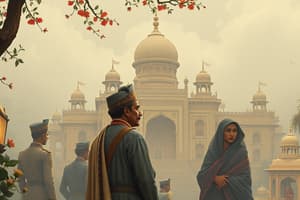Podcast
Questions and Answers
What was Indira Gandhi's relationship to Jawaharlal Nehru?
What was Indira Gandhi's relationship to Jawaharlal Nehru?
- Sister
- Mother
- Daughter (correct)
- Aunt
What significant agricultural initiative did Indira Gandhi implement during her tenure?
What significant agricultural initiative did Indira Gandhi implement during her tenure?
- Yellow Revolution
- Green Revolution (correct)
- White Revolution
- Blue Revolution
Indira Gandhi was known for implementing which of the following policies aimed at social improvement?
Indira Gandhi was known for implementing which of the following policies aimed at social improvement?
- Trade liberalization agreements
- Military expansion projects
- Poverty alleviation programs (correct)
- Urbanization policies
During which period did Indira Gandhi impose strict restrictions on civil liberties?
During which period did Indira Gandhi impose strict restrictions on civil liberties?
Indira Gandhi's tenure as Prime Minister began in which year?
Indira Gandhi's tenure as Prime Minister began in which year?
What was one of the major impacts of the nationalization of banks during Indira Gandhi's leadership?
What was one of the major impacts of the nationalization of banks during Indira Gandhi's leadership?
Which of the following critiques was leveled against Indira Gandhi during her time as Prime Minister?
Which of the following critiques was leveled against Indira Gandhi during her time as Prime Minister?
What was one of Indira Gandhi's contributions to women's rights?
What was one of Indira Gandhi's contributions to women's rights?
Flashcards
Who was India's first female Prime Minister?
Who was India's first female Prime Minister?
Indira Gandhi was the first woman to hold the office of Prime Minister of India.
What is Indira Gandhi's key role in Indian history?
What is Indira Gandhi's key role in Indian history?
She served as Prime Minister of India for three consecutive terms, leading the country during a period of significant political and economic change. Her tenure saw the implementation of numerous policies aimed at improving the lives of ordinary Indians.
What is the 'Green Revolution'?
What is the 'Green Revolution'?
The 'Green Revolution' was a series of research, development, and technology transfer initiatives, occurring between the 1940s and the late 1970s, that increased agricultural production worldwide, particularly in developing countries. It was a major initiative launched during Indira Gandhi's tenure as Prime Minister of India.
How did Indira Gandhi make banking more accessible?
How did Indira Gandhi make banking more accessible?
Signup and view all the flashcards
What was the 'Emergency' period?
What was the 'Emergency' period?
Signup and view all the flashcards
What are some criticisms of Indira Gandhi's leadership?
What are some criticisms of Indira Gandhi's leadership?
Signup and view all the flashcards
What is a defining moment in Indira Gandhi's life?
What is a defining moment in Indira Gandhi's life?
Signup and view all the flashcards
What is Indira Gandhi's legacy?
What is Indira Gandhi's legacy?
Signup and view all the flashcards
Study Notes
Introduction
- Indira Gandhi was a prominent Indian political leader, serving as Prime Minister of India for three consecutive terms.
- She was the first female Prime Minister of India.
Early Life and Political Career
- Born Indira Priyadarshini Nehru in 1917.
- Daughter of Jawaharlal Nehru, India's first prime minister.
- Received education in India and abroad.
- Involved in Indian politics from a young age, often accompanying her father on political tours.
- Played a key role in the Indian National Congress party, working alongside her father and other leaders.
- Married Feroze Gandhi (not related to Mahatma Gandhi).
Rise to Prime Ministership
- Following her father's death and subsequent political events, Indira Gandhi assumed leadership roles within the Congress party.
- Became Prime Minister in 1966, succeeding Lal Bahadur Shastri.
- Used her influential position to implement major governmental projects, programs, and reforms.
- Implemented policies aimed at poverty reduction, rural development, and social justice.
Key Policies and Achievements
- Focused on rural development, poverty alleviation, and social justice programs, including land reforms and poverty eradication programs.
- Implemented the Green Revolution, significantly impacting agricultural production.
- Nationalized banks, aiming to make banking more accessible and improve financial inclusion.
- Launched several ambitious development projects focused on improving infrastructure, creating employment opportunities, and bolstering economic growth.
- Implemented policies promoting women's empowerment and development.
Controversies and Criticisms
- Faced criticism for authoritarian policies and suppressing political dissent.
- Her Emergency period (1975-1977) witnessed strict restrictions on civil liberties and freedom of speech.
- Was accused of manipulating elections and using emergency powers for political gains.
- Public outrage and ensuing protests led to her party losing significant political support.
Legacy
- Remained a significant figure in Indian politics and led efforts for economic growth during her tenure.
- Faced both praise and criticism for her leadership style.
- Was assassinated in 1984.
- Her actions, both positive and negative, shaped the trajectory of India's political landscape.
- Played a major part in shaping modern India's political, economic, and social landscape.
Other Significant Events During Her Prime Ministership
- The 1971 war with Pakistan, which led to the creation of Bangladesh.
- The Green Revolution and its impacts on Indian agricultural production.
- The Emergency and its effects on civil liberties and the political landscape.
- The growing economic disparity and the political challenges amidst rapid societal changes.
- Growing conflicts between different social and political factions within India.
Studying That Suits You
Use AI to generate personalized quizzes and flashcards to suit your learning preferences.




